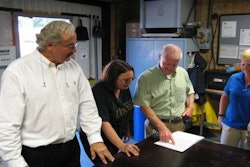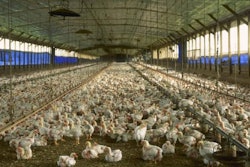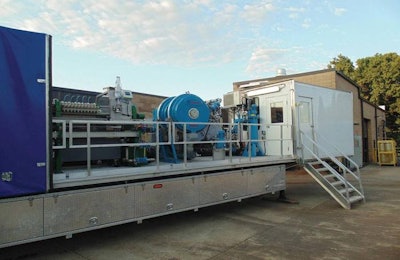
Keystone Foods consistently exceeds poultry processing wastewater discharge requirements at the Reidsville, North Carolina, further processing facility while driving the annual tonnage sent to the landfill towards zero. This focus on clean water and the environment makes the facility a 2015 Clean Water Award Winner.
Discharging process wastewater to municipal water reclamation facilities is an increasingly difficult and expensive challenge, yet Keystone Foods' Reidsville facility has been allowed to simply submit quarterly monitoring with limits under its renewed pretreatment permit. This compares with its previous permit with limits that included bimonthly sample analysis by the municipality. The team shows that performance counts with environmental compliance requirements.
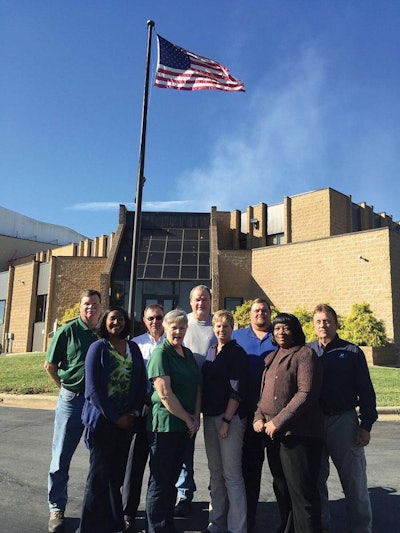
Keystone Foods environmental team at Reidsville: (front row) Satrina Daniel, human resources manager; Terri Prusia, first shift production manager; Tina Williams, environmental manager; Sylvia Galloway, quality assurance manager; (back row) Tim Pruitt, supply chain manager; Tom Harris, general manager; Paul Lewis, second shift production manager; Clint Southard, IT manager; Mike Haywood, plant manager
The environmental management system team includes members in information technology, environmental, quality assurance, maintenance, production and supply chain management.
Keystone Foods is a global supplier of protein products with a significant vertically integrated poultry operation that includes a vibrant North American footprint east of the Mississippi River. Although increasingly customary in the poultry processing industry, the company remains a leader for building a strong environmental and corporate stewardship upon a clean water ethic. The Reidsville facility exemplifies that innovation is at the heart of the Keystone approach and that value, along with collaborative teamwork, defines their aspirations for environmental regulatory management.
Keystone Foods' poultry wastewater facility
The Keystone Foods Reidsville facility processes 700,000 pounds of poultry per day using an average of 0.185 million gallons per day. It is an indirect wastewater discharge facility, sending its pre-treated effluent to the local municipality.
The environmental management system (EMS) team is comprised of members representing information technology (IT), environmental, quality assurance (QA), maintenance, production and supply chain. The facility general and plant managers are also active partners. Annual self and corporate audit; an external audit every three years; and annual employee training ensure the environmental aspirations and results are identified and shared with all employees. Further proof of the Reidsville ethic based on clean water is that to receive the highest pay level, maintenance employees are required to be able to operate the wastewater system.
A key operational aspect of the EMS is a software solution that consolidates all the related documents, tags permit required actions and generates reminders. It enables a compliance baseline and allows the environmental team to target bigger opportunities that achieve more sustainable processes.
While ensuring the wastewater system exceeded standards, as part of the broader EMS, the environmental experts have focused on reducing materials that are traditionally diverted to landfills. Here, a long-standing practice of composting dissolved air flotation by-products has been expanded.
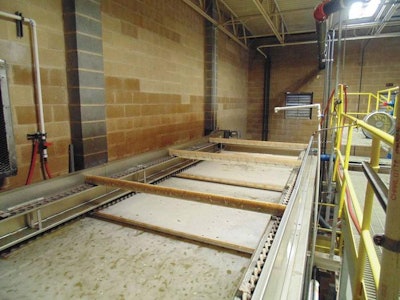
Dissolved air flotation unit produces by-products which are sent for composting.
The enhanced approach originated from a collaborative teamwork principle that includes vetting and then working with vendors and suppliers. A vendor was identified that takes both by-products and wax boxes to produce landscaping compost. Recently, an investment was made in a new rotary press that added by-product value by reducing moisture and, thus, transportation costs. Ultimately, the goal is to send zero tonnage to the landfill by 2020.
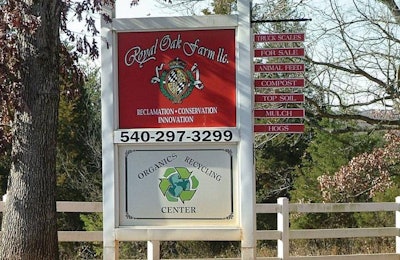
Dissolved air flotation unit by-products are sent for composting at Royal Oak Farms.
Focus on stormwater compliance
While not part of the top EMS projects, the environmental team has tackled stormwater compliance as the regulatory climate has changed to include bacteria. The team updated the drawings related to stormwater flows and conducted video surveillance of selected outfalls, allowing them to identify structural improvements that prevent unauthorized spill discharges from an area that was relatively accessible. The better understanding of stormwater runoff also generated an improvement that added a new action to the sanitation master schedule focused on reducing fecal bacteria.
A related structural upgrade was also installed to enhance control of suspended solids. Using their collaborative teamwork principle, the team reached out to the State of North Carolina Department of Environmental Quality (DEQ) -- a step that helped reduce the number of outfalls as well as develop a remedy for an outfall that consistently exhibited high fecal coliform counts. DEQ employees identified a sediment control device containing a natural anionic flocculant intended to reduce coliform bacteria loads and other pollutants in stormwater. The facility has successfully used the filter sock as part of its overall stormwater pollution prevention plan.
Water and energy conservation
Moving forward, the team remains focused on water and energy usage as part of the overall sustainability goals. Tina Williams, environmental manager for the Keystone Foods Reidsville facility, said, “Reducing our water intensity is as important a goal as exceeding our wastewater permit. We have seen a slight increase in water usage year-to-date compared to our goal, but we think it is related to a change in product configuration.” The EMS team is also investigating solar exchange suppliers to improve energy management and increase energy efficiency.
To stay on top of the basics, the team has used the WaterWiser drip calculator approach with great success. Here, the time needed to fill a known-volume container is measured, and the results are entered into the drip calculator. “We not only identified an opportunity to save water from a leaking hose but also energy since it was heated water. We made a video of the how to measure the water lost from a leak and all of our employees have watched it as part of our EMS training,” she explained.
Poultry processor has community partnership
Williams notes that with everything else going on, the facility and environmental team is focused on sustaining its partnership with the local community. “The local school system is very important to us. We call our partnership with the local sheriff’s office 'Keystone Cops.' Together we raise money for the arts programs in the schools. Some of the other things we have done are to help the school system Ag department with raised garden beds, using materials made from our composted DAF by-products donated back from our vendor.”
Keystone Foods’ 2020 goal at Reidsville is to send zero tonnage to the landfill.
Collaboration and teamwork make Keystone Foods a winner with the community, vendors, regulators and employees, as well as with the U.S. Poultry & Egg Association, sponsor and presenter of the Clean Water Award.
View the video to learn more:
Rotary press adds value to poultry wastewater byproduct, http://video.wattagnet.com/34n2/



